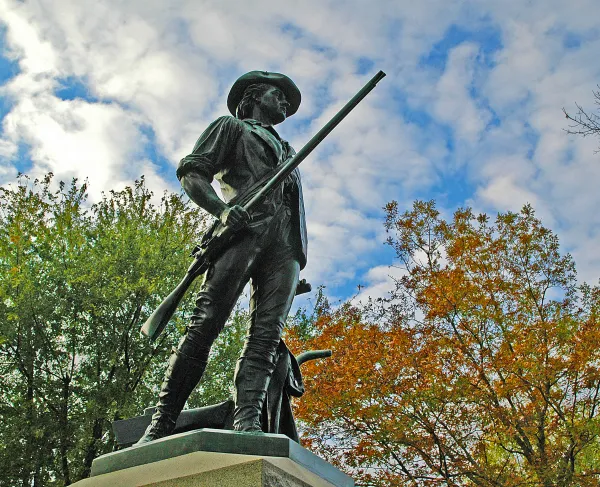Isaac Davis

On April 19, 1775, as American militia rushed forward at North Bridge during the Battle of Concord, Captain Isaac Davis fell—the first American officer to die in the Revolutionary War.
Born on February 23, 1745, Isaac Davis grew up in West Acton, Massachusetts. His parents were Ezekial and Mary Davis. He became a farmer and gunsmith by trade and was described as energetic and brave. At age nineteen, Davis married Hannah Brown, and they had four children.
In 1774, the Massachusetts Provincial Congress asked communities to form militias that could be assembled rapidly to oppose British expeditions. The previous decade had seen rising tensions between England and the colonies over representation and taxation. Massachusetts colonists had been especially vocal and organized, leading to moments like the Boston Massacre and Boston Tea Party. In response, more British troops arrived in Boston, trying to keep order and British authority. During 1774, British soldiers had made several attempts to seize gunpowder and weapons that had been stockpiled and the local militias were supposed to respond to their threats. Following the recommendation of the provincial congress, the village of Acton organized a company of Minutemen, and Isaac Davis was elected to be their captain. Using his gunsmithing skills, he created bayonets and cartridge boxes for most of the men under his command. He also spent time training the militiamen and letting them shoot at targets behind his home. With their marksmanship, training and equipment, the Acton company was one of the best prepared and organized units in Massachusetts.
Acton was a couple miles west of Concord, and for weeks in the early spring of 1775, locals suspected that the British might try to seize military supplies stockpiled at Concord. During the night of April 18, 1775, Samuel Prescott rode to Isaac Davis’s farm, bringing word that the British soldiers were leaving Boston and heading for Concord. Davis gathered the militia at his home. His wife later remembered that he “said but little that morning. He seemed serious and thoughtful; but never seemed to hesitate as to the course of his duty.” Before he left, he told Hannah to take care of their children, and she would remember feeling that she would never see him alive again.
Acting from the information he had received from Prescott, Davis marched the Acton Company toward Old North Bridge. There, he met Colonel Barrett, and the commanders of other companies rallying at Concord. About 500 local men had gathered and watched the British troops in Concord and near the bridge. In total, 700 British soldiers had left Boston, but they had divided into smaller groups to search the town and nearby farms once they had arrived in Concord. Observing smoke from the British burning a small pile of discovered supplies, the American officers through the British were destroying the town. Barrett gave orders to attack the British soldiers at the bridge. As they planned the attack, Barrett asked Davis if he would lead the attack since his men were equipped with bayonets. Captain Davis agreed, saying something like: “I haven’t a man who is afraid to go.” (There are several versions of his words.) Before they started the advance, Colonel Barrett ordered them to let the British fire first.
As the militia marched toward the bridge, the British soldiers fired warning shots, then a scattered volley. A musket ball from the first volley hit Captain Isaac Davis in the heart, killing him instantly while his militiamen continued to advance. Later, Davis was buried in Acton—the first American officer killed in combat during the Revolutionary War.
In 1851, a monument to Davis was erected in Acton, and his remains were interred beneath the monument. A couple decades later in 1875, “The Minute Man” statue was dedicated near Old North Bridge at Concord near the spot Davis was believed to have fallen, and the sculptor used photographs of Davis’s descendants as inspiration for the statue’s figure. This statue is used in the seal of the National Guard of the United States.
Related Battles
93
300





